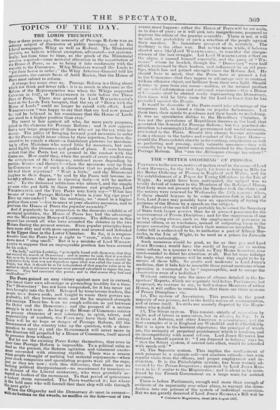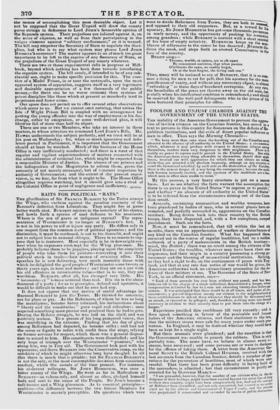THE " BETTER ORDERING" OF PRISONS.
PLIEVI011e to the recess, notices of' motion stood in the name of Lord J owe RussEet., for the 10Ih April, for lenve to bring in Bills for the Better Ordering of Prisons in England and WaItee and for the establishment of a Prison for Young Offenders in the Isle of Wight. As might have been anticipated, the subject was so totally devoid of interest to the Members of the Reforneel !louse, that forty were not present when the Speaker took the chair ; and the notices were renewed fur Wednesday the 25th instant: uhen, if there should happen to be some attractive dish in the bill of fare, Lord JOHN may possibly have an opportunity of trying the patience of the House by a speech on the subject. The object of the one bill will probably be, to invest the Secretary of State with larger powers than he at present possesses for the improvement of Prison Discipline ; and for the suppression of one or two glaring abuses, such us the employment of pa isoners in menial otlices, or as wardsmen, instead of subjecting them to the proper corrective discipline which their sentences intended. The latter bill is understood to be, to authorize a part of Albany Bar- racks, in the Isle of Wight, to be used as a prison for Juvenile Offenders exclusively. Such measures would be good, as far as they ge; and Lord Jolter RUSSELL would have the credit of having set in motion some reform in a quarter to which no Tory Home Secretary ever condescended to direct his attention at all. But let none indulge the hope, that our prisons will be made what they ought to be by means of these bills. So geetle and moderate is Lord JOHN'S medicine, that it bids fair to resemble those patent nostrums whose Operation is warranted to be " imperceptible, and to escape the observntion even of a bedfellow !"
Without entering into the mass of abuses detailed in the In- spectors' Reports, which are regularly laid before Parliameet, but unopened, we venture to say, by halra-dozen Menibere of either House, it will suffice to remark here, that there are three systems of Prison Discipline : she
1st, The system of Association. This prevails in the great majority of our prisons, awl is the fertile source of contamination, and of crime itself. Its evils are scarcely disputed by the Magis- trates who uphold it.
21, The Silent system. This consists strictly of separation by night, and of' labour in association, but in silemes by div. It is in force at Auburn, and other Atnerican pcniteutiaries; ieol the best examples of it in England are Wakefield and C mldbat
But it is open to the heaviest objections; the principal of which are, the necessity of perpetual punishment which it involves, and its incompatibility %%WI moral reform. Lord JOHN RUSSELL has declared himself against it : " I am disposed to believe," says he, " that the Silent system, it' carried into effect, would be attended with much evir* 3d, The Separate system. This implies the confinement of each prisoner in a separate cell—not absolute solitude—but with regular visits from the officers, and proper employment and in- struction. It is the Philadelphia system; has been warmly ad- vocated by the Prison-Inspectors ; approved by Lord JOHN Rus- seea in his Circular to the Magistrates ; and is about to be intro- duced by the French Government on a large scale for untried prisoners.
There is before Parliament, enough and more than enough of evidence of its superiority over other plans, to warrant the intro- duction into our prisons of the system of individual separation. But we are greatly deceived if Lord Joicv Russsres Bill will be
• Circuital° Msgistratrs, dated liras August 11337.
the means of accomplishing this most desirable object. Let it not be supposed that the Great Unpaid will draw the county purse strings in deference to Lord JOHN'S favourable opinion of the Separate system. Their prejudices are inlisted against it, on the score of expense, as well as from their participating in the vulgar clamour against "solitary confinement," as it is termed. The bill may empower the Secretary of State to regulate the disci- pline, but who is to say what system may please Lord JOHN RUSSELL'S successor? The matter appears to us of much too great importance to be left to the caprice of any Secretary of State, or the prejudices of the Great Unpaid of any county whatever.
There are two or three experimental cells in progress at Mill- bank, beyond which nothing has been done towards introducing the separate system. The bill surely, if intended to be of any sub- stantial use, ought to make specific provision for this. The erec- tion of a Model Prison, in or near the metropolis, upon the most approved system of separation, suggests itself as a very legitimate and desirable appropriation of a few thousands of the public money,—for there can be no worse economy than systems of prison discipline like those which at present so manifestly tend to perpetuate and foster crime. Our space does not permit us to offer several other observations which occur to us. But we cannot omit noticing, that unless the Isle of Wight Prison Bill is coupled with an arrangement for putting the young offender into the way of employment on his dis- charge, either by emigration, or some well-devised plan, it will likewise fail of more than half its object.
There are one or two Members, who take an interest in these matters, to whose attention we commend Lord JOHNS Bills. Mr. HAWES understands the subject perfectly, and we trust will be at his post on Wednesday; for, when so much ignorance and indo- lence prevail in Parliament, it is important that the Government should at least be watched. Much of the business of the Home Office is very inefficiently conducted ; and there is a want of that regular and vigilant superintendence of matters connected with the administration of criminal law, which might be expected from a responsible Minister of Justice. The abuses of our prisons and the indisposition of the Magistrates to reform them, prove the necessity of not merely occasional, but of constant inspection by authority of Government; and the extent of the present supers vision, is, we fear, far from what it ought to be. The Horne Office altogether requires watching, lest it should grow into a rival of the Colonial Office in point of negligence and inefficiency.























 Previous page
Previous page